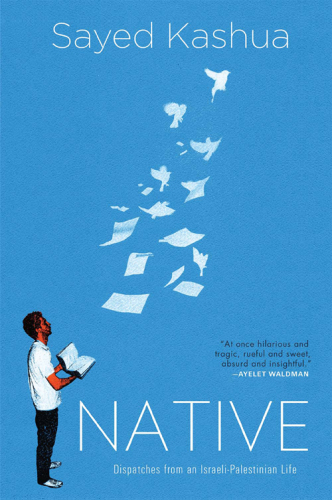
Native
Dispatches from an Israeli-Palestinian Life
کتاب های مرتبط
- اطلاعات
- نقد و بررسی
- دیدگاه کاربران
نقد و بررسی

October 12, 2015
This startling and insightful collection of Kashua’s (Second Person Singular) popular weekly columns for the Hebrew-language newspaper Haaretz narrates the sobering reality of life as an Israeli-Palestinian. A sense of mistrust and fear constantly thrums beneath his otherwise humorous reports on family life, literary life, and occasional drunkenness. Behind the bashful, bumbling antiheroics and ubiquitous self-deprecation lies a quiet, sane voice pleading for integration of “the two narratives of the two peoples.” Kashua conveys devastating social critique through dry wit, precise metaphor, and seemingly innocent subjects, while in the periphery the rife racism and rising body count speak to the increasing struggle to reconcile two drastically different viewpoints. Whether recounting the insults encountered by his children, shaming from friends and critics alike, Kafkaesque encounters with the civil justice system, or his dreams of escape, Kashua maintains a light satiric tone and steady compassion even as the essays slide into disillusionment. Some nuances may be lost on American audiences, but Kashua’s subtly shaded, necessarily complex, and ultimately despairing account of the tensions within his homeland, “so beloved and so cursed,” is bound to open the eyes and awaken the sympathies of a new swath of loyal readers. Agent: Deborah Harris, Deborah Harris Agency.

December 1, 2015
A journalist and novelist's sharp-eyed take on his life as a Hebrew-speaking Palestinian in Jerusalem. In this collection of columns for Haaretz, a weekly Israeli newspaper, Kashua (Israel Studies/Univ. of Illinois; Second Person Singular, 2012, etc.) illuminates the condition of Palestinians in Israel by offering humorous, and at times painful, anecdotes about his own life. In the opening essay, the author establishes the satiric tone that characterizes the text, poking fun at himself as "a chronic liar [and] gossip" by assuming the voice of his long-suffering wife. Kashua then goes on to detail the inconveniences that his family suffers as ethnic and religious minorities in Jerusalem. Believers in a bicultural, bilingual Israel, the author and his wife found their ideals under constant siege. In "High Tech," for example, he describes an outing with his young daughter when he told her she could speak Arabic "everywhere, anytime [she] want[ed], but not at the entrance to a mall," which was protected by heavily armed Israeli security guards. His deeper anxieties about being a minority are apparent in such essays as "Taking Notice." There, he tells the story of a sign he put up at the all-Jewish apartment complex where he and his upwardly mobile family moved. The possibility of not being accepted by his neighbors bothered him so much that he worried incessantly about everything, including whether he was using proper Hebrew phrases and handwriting techniques. Yet the careful moderation he practiced while living in a country hostile to Palestinians offered him neither peace nor safety from either "Israelis who hurl accusations of betrayal and disloyalty...[or] Arabs who hurl accusations of betrayal and segregation." Eventually, Kashua and his family moved to the United States, where they faced "another type of society and the inevitable acclimatization problems." By turns funny, angry, and moving, Kashua's "dispatches" offer revealing glimpses into the meanings of family and fatherhood and provide keen insight into the deeply rooted complexities of a tragic conflict. A wickedly ironic but humane collection.
COPYRIGHT(2015) Kirkus Reviews, ALL RIGHTS RESERVED.

September 1, 2015
Distinguished Israeli novelist Kashua has won a half-dozen international awards and publishes a weekly column in Haaretz newspaper; the film Dancing Arabs, which draws on two of his novels, opened the Jerusalem International Film Festival in July 2014. He's also a Palestinian Arab who recently moved his family to Urbana-Champaign, IL, explaining that he had finally despaired of his dream of Jewish-Arab coexistence. Written between 2006 and 2014, the essays here explore the personal and the political and how they intersect.
Copyright 2015 Library Journal, LLC Used with permission.

























دیدگاه کاربران